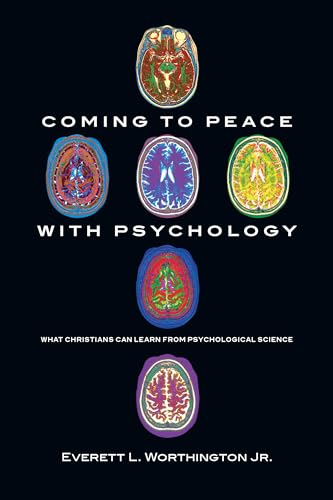Coming to Peace with Psychology: What Christians Can Learn from Psychological Science
Written by Everett L. Worthington Jr Reviewed By William M. StruthersWhen it comes to the intersection of psychology and Christianity, there are few figures who deserve more attention and acclaim than Everett Worthington. For the past two decades he has been challenging those within Christian circles to be less confrontational with the discipline of psychology and has increased the cache of Christian intellectuals among those who are outside the church. In his most recent book, Coming to Peace with Psychology: What Christians Can Learn From Psychological Science, Worthington directs his attention to the way that Christians should be engaging psychological research.
The first section of the book deals with a number of philosophical, theoretical, and theological issues that are helpful for both veterans and novices. Loaded with examples from personal experiences, contemporary books, and popular culture—while armed with an extensive and deep knowledge of the psychological research-literature—Worthington impressively crafts a tale of how psychology and the Christian faith can be mutually beneficial. Dealing with broad questions about the nature of scientific inquiry and the place of theology among the disciplines, he provides a framework that is as intuitive as it is developed. In several chapters from the first section of the book, he expands on the notion of science and faith as relational partners. He provides a fair and informed analysis of the scientific method and examines in his relational model how theology and psychological science dance together. He is quick to challenge weak arguments from both sides of the aisle against such a relationship and avoids being overly strident, always careful to highlight the strengths when they inform each other well.
In the second section, eight chapters highlight ways that psychological science can contribute to theology. These chapters handle topics such as psychology as a new voice in matters of theological importance, examples of convergence to strengthen theological claims such as the dignity of individuals, and the role of forgiveness in relationships. This section contains some of the best writing of the book and addresses a range of current hot-button issues. The elephant in the room, however—homosexuality—is noticeably absent. My impression is that its absence is understandably intentional. Given the broad aims of the book, the inclusion of homosexuality (which is not so much a hot-button topic as it is, unfortunately, a nuclear topic in contemporary discourse) would have significantly distracted readers from the primary purpose of the book. Another topic given less space than it deserves is the neurobiological nature of psychological experience. This was particularly surprising given the cover art, which depicts several brain scans ordered in the shape of a cross and implicitly equates brain with mind. Given the direction of much of the brain-imaging research that is being conducted (and has been noted by research coming out of Worthington’s lab), a more extensive section that went into depth on the mind-brain link would have been a welcome addition.
Overall, the text is exceptionally well-written, and the flow of ideas is coherent, concise, and consistent. Those who have an undergraduate-level understanding of psychology will find this book incredibly useful and enlightening. It honestly assesses the limitations of psychology, but does so in a balanced tone of confidence and humility when handling the scientific data that psychology produces. The theoretical foundation of the first section is one of the better treatments one can find, and the number of analogies and examples that are used are helpful and succinct. It is a bit surprising that a text like this is needed today as a way for psychologists to justify themselves within the church. Yet for those who are looking for a sound and thoroughly irenic argument for the integration of faith and psychology, there are few texts that will surpass this one.
My guess is that many theologians will find Worthington’s arguments to be adequate and straightforward, though they may quibble with him on some of the minutiae. In the same way, psychologists may feel there are some important methodological or theoretical matters that warrant additional space (as indicated in this review). Nevertheless, I found myself caught up in the interdisciplinary mindset that Worthington brings to the table, and this is exactly what the text is designed to do. It draws readers off of their intellectual and academic turf, challenging both theologians and psychologists to appreciate the nuances of how both speak to the human condition. Do not read this book if you wish to have dogmatic, discipline-centric assumptions confirmed. It will, however, expand the reader’s understanding of the dance of life, knowledge, and faith. There are few books that manage to contain the intellectual rigor and whimsical tenor that are as accessible as this book. I highly recommend Coming to Peace with Psychology and anticipate assigning it to students as required reading in years to come.
William M. Struthers
William M. Struthers
Wheaton College
Wheaton, Illinois, USA
Other Articles in this Issue
Listening to or reading the reflections of others on preaching is, for most preachers, inherently interesting and stimulating (whether positively or negatively)...
For Christians in the United kingdom, the Bible appears to have suffered a reversal of fortune with regards to its standing in public life.
The relatively recent interest among evangelicals in engaging ancient Christian tradition is without question a welcome development...
Intrinsic Canonicity and the Inadequacy of the Community Approach to Canon-Determination
by John C. PeckhamScholars continue to discuss and debate the scope of the biblical canon...
Is the Reformation Over? John Calvin, Roman Catholicism, and Contemporary Ecumenical Conversations
by Scott M. ManetschIs the Reformation over? At first blush, this question would appear to be a rather peculiar one to ask...







